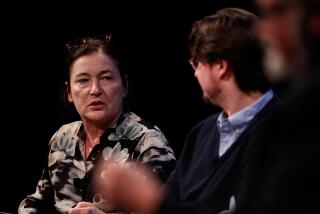A Woman of Independent Means :...
- Share via
With the recent spate of Victorian literary biographies, from a reassessment of the Brontes to an examination of Christina Rossetti, it comes as no surprise that a newly introduced edition of Martha Saxton’s fascinating 1977 life of Louisa May Alcott should appear, especially considering the renewed interest in the New England writer. What with the recent release of a new film version of “Little Women” to the discovery of her charming “lost” thriller, “A Long Fatal Love Chase,” to the reissue of a collection of her pseudonymous “blood and thunder” tales, this indeed seems the year of Louisa May Alcott.
If you’re only familiar with her “Little Women” trilogy (the sequels are “Little Men” and “Jo’s Boys”), Alcott’s persona seems a paradigm of New England virtue and respectability: spinster, loving aunt, writer of virtuous novels and guides to good living. It is the usual assumption that Alcott is her most famous character Jo March--the reformed tomboy, the wild girl who learned the joys of restraint and sacrifice while being the center of a happy family. It is only with Saxton’s thoroughly engaging and finely detailed research that one discovers that the perennial bestseller is less an interpretation of the Alcott household than a fantasy fabricated for the delight of Alcott’s parents, and in the final analysis, simply written for money. The phantoms of the ideal March family fade away under the dour, perverse reality of the Alcott home. Standing in contrast to the fiction, the revelations are, if not shocking, at least heartbreaking.
Born and raised in a life of poverty, Alcott’s biography rightly begins not with her birth, but with her parents’ courtship. Bronson and Abba’s personalities so disfigured Louisa’s life, comprehension would be impossible without the extended account Saxon gives of the young couple. By the time Abigail May (“Abba”), a well-bred Bostonian, had met Bronson, he had renounced labor for a life of the mind, falling in with the region’s transcendentalists and contributing to the movement his own progressive theories on education reform, (one of which equaled Christ’s divinity with his own).
This is the man, passive to a fault, with stringent ideals and strange ideas, that Abba fell in love with, would come to worship and would eventually jeopardize the well-being of her children to support. Their life together reads like a pauper’s tale of New England, moving from one set of rooms to another, subsisting at times on apples and bread, and as Bronson refused to seek regular paid work, surviving on borrowed money.
Into this debacle the four girls were born. They followed Bronson’s whims around New England, mainly back and forth from Boston to Concord, living on the generous cash gifts of faithful friend Ralph Waldo Emerson and from Abba’s brother Sam, who more than once wondered why Bronson wouldn’t support his family like any other. Abba remained devoted, and agreed with her husband that he was far to noble to labor.
Childhood was not all Dickensian gloom for Alcott. When in Concord she was free to roam through the natural beauty of Walden Pond while admiring her father’s famous companions, Emerson, Thoreau and Hawthorne. Though Bronson repeatedly attempted teaching, he always ended up in debt, relying on Abba to support the family through a series of business opportunities, from running a domestics agency to, ironically, being paid to hand out goods to the poor. Abba, martyr of the home front, instilled in Louisa the need of feminine self-sacrifice for the good of the man, and aroused in her daughter the desire to assume the role of savior.
Considering her father’s circle, the literary life was not a novelty to Alcott, and soon she was sending off her own stories for publication. The idea of financial independence was alluring: “Though an Alcott I can support myself. I like the independent feeling; and though not an easy life, it is a free one, and I enjoy it. I can’t do much with my hands; so I will make a battering ram with my head and make a way through this rough-and-tumble world.”
These pieces, written under various pseudonyms, were her “blood and thunder” or “lurid” tales. They not only helped support the family, they were Alcott’s passion. Unlike the March family trilogy that was to later make her an American icon, she enjoyed the writing of her grandiose fantasies; they exorcised her demons, the heroines dared what she could only dream of. The newly reissued collection, “Behind a Mask,” offers four of her thrillers, giving a more accurate indication of Alcott’s taste when away from the enforced piety of home.
The masked thrillers were discovered in 1943, but not until Morrow’s 1975 publication of the tales were they available to a wide audience. Unfortunately, they only prove interesting in their capacity to reveal an otherwise unknown side of the author. The stories themselves tend to the girlishly dramatic, with heightened emotions and an overblown sense of justice, though when taken in tandem with the biography, the collection is admittedly a tantalizing curiosity.
Indeed, Alcott’s women are unabashedly willful, at times wicked; she gives them what she calls masculine traits (that her father repeatedly accused her of having) with which they seem to prosper. Pauline, spurned by her lover for a rich engagement, weaves a complex web of revenge. She marries a wealthy young Spaniard, does everything in her power to bankrupt her ex-lover and destroy the happiness of his young wife, all the while reveling in the cleverness of her retribution. However no Alcott heroine is more successful in her schemes than Jean Muir, femme fatale of the collection’s title story. Jean, an actress in her 30s, poses as a young governess to a titled English family in the hopes of landing one of the young gentlemen for herself. She shapes the contours of her evil ambition with all the planning and cool temperament of a man. The ending is delicious, though excessive: Jean succeeds beyond her wildest plans and literally snubs her nose at the established order.
Somehow, the newly published “A Long Fatal Love Chase” escapes the overblown theatrics of the short stories and offers an engaging thriller, albeit with the convoluted plot machinations common to serialized novels. Written two years before “Little Women,” the novel was ultimately rejected, deemed too controversial: “She . . . looked at the vigorous figure before her with the genuinely womanly admiration for a manly man.” (p.11) It is a page turner in the best sense of the phrase. Alcott delivers the sensational characters of Rosamond Viviana and the destructive love of her life, the wicked Philip Tempest. He woos and wins her, then carries her away from her cold, remote, island home to his villa in Nice. In the grand tradition of the Victorian novel, Philip’s hidden wife and child are discovered, and so begins the long, fatal love chase--Rosamond feels the betrayal of her husband as he vows to reclaim her, crisscrossing Europe on the trail of her changing disguises.
Most evident in these thrillers is Alcott’s dedication to a new ideal for women. Though bombarded with the conflicting ideologies of the period, she nevertheless endows the women of her thrillers with the stamina, fortitude and the independent spirit she herself was chastised for possessing. “A Long Fatal Love Chase” is a significant addition to the Alcott library--in it the frigidity of New England high morals is left behind for the unrestrained passions of a distant Europe.
At the urging of both her publisher and her father, Alcott wrote “Little Women.” She was 35, and a near-invalid since her nursing experiences in the Civil War when a fever was “cured” by mercury poisoning. Her older sister Anna had deserted the family by marrying the dull and dependable John Pratt, her sister Elizabeth had wasted away into death and baby sister May, the family’s one independent spirit, was off pursuing an artistic career. With the publication of the book, the writing of which bored her and which she considered “moral pap for the young,” came the financial freedom the family had always longed for, yet it also created what Saxton calls Alcott’s emotional immaturity in writing. By leaving behind the subtle ambiguity and intellectual changes of her thrillers, she became trapped in a self-made world of moral instruction, where the universe was divided into simplistic spheres of good and bad, and it “became another extension of her entrapment.”
Nothing ever again equaled the popular or financial success of her March family trilogy, and she was in a sense finally snared in the role of the eternally dutiful daughter, spewing forth the well-absorbed lessons of her parents.
Though success bought her freedom, a grand tour of Europe and the ability to support Bronson and Abba in their advancing years and May’s artistic ambitions, Alcott never seemed able to loosen the restraints of her servitude. Abba had taught her the lessons of self-denial well, and that, coupled with sporadic bouts of invalidism, prevented Alcott from ever enjoying her victories over hardship. Holidays were cut short from excessive guilt, an independent lifestyle was thwarted by an acute sense of familial obligation.
Indeed, it seems her domestic responsibilities were what kept her alive--after the death of May in childbirth, the death of her mother and brother-in-law, Alcott had little left to live for and three days after her father’s passing, she too died. What proves so fascinating about the Saxton biography and “A Long Fatal Love Chase,” (and to a much lesser extent the story collection) is the reversal made in addressing Alcott’s life and work--the solid, upright pedagogue melts away before the image of the ardent suffragette, sole support of family and home and rebel, despite herself.
More to Read
Sign up for our Book Club newsletter
Get the latest news, events and more from the Los Angeles Times Book Club, and help us get L.A. reading and talking.
You may occasionally receive promotional content from the Los Angeles Times.










